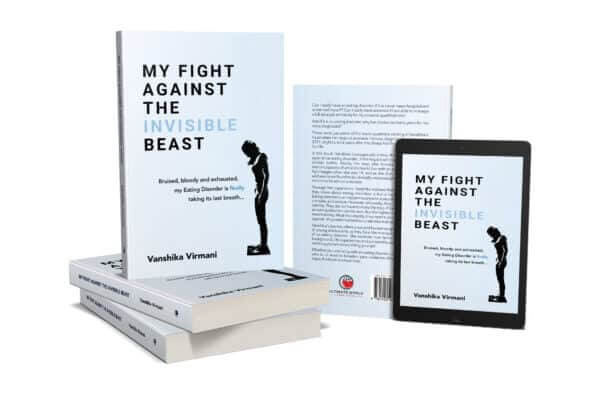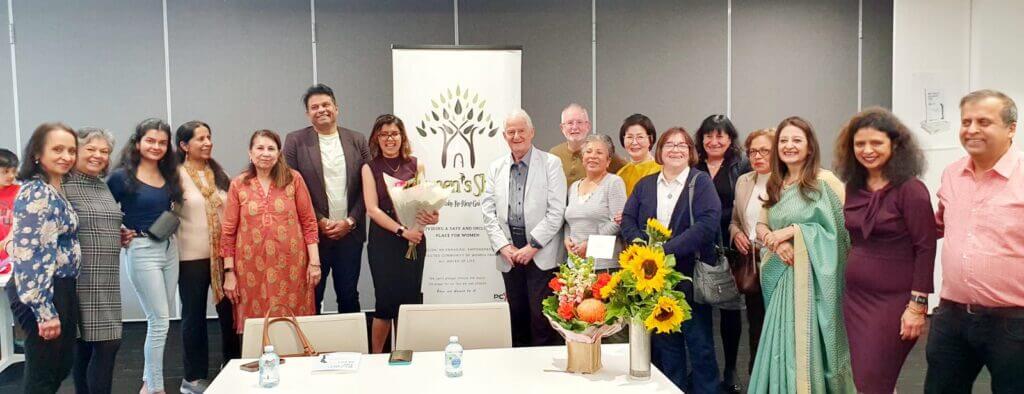Sitting down with Vanshika Virmani, I couldn’t help but be taken aback when she revealed that she never wanted to be a writer.
“Honestly it’s an interesting story, but it all started with simple journaling.” Virmani shared with Indian Link. “I remember being so overwhelmed with my thoughts one night that I chose to write them down in the chaos. When I went to look back at what I had written, it was like reading someone else’s words. They were extremely strong and powerful.”
Now having published her book My Fight Against The Invisible Beast, Vanshika has proven that the greatest weapon we hold is our words. The emerging author presents a brave first-person account, set in Australia’s Indian community, battling Anorexia Nervosa. Heralding a new dawn where the desi community is more mindful of ‘invisible beasts’, Vanshika’s novel narrates a story of both pain and power.

Answers
At 15, Vanshika never suspected she was in the grip of an eating disorder, and considered her restricted eating habits to be normal. Back then, Anorexia Nervosa, also known as anorexia, was simply a medical term she discovered while reading in high school.
“I was in the library and just by chance, I picked up a book on eating disorders. After flicking through the pages, I realised that I might actually have such a disorder myself.”
Recognising in herself the fear of becoming overweight, a distorted body image, and maintaining a low weight through starvation and overexercise, Vanshika was stunned to realise her eating habits were listed under a psychological illness.
“At the time I had already started writing my overwhelming thoughts down, and because I didn’t want anyone to know I took the book back and surrendered to the stigma.”

Acceptance
Nine years on, Vanshika Virmani has deemed the roots of her eating disorder to be toxic perfectionism and diet culture, explaining her invisible beast to be a deafening and disparaging ‘voice’. Diet culture has commonly been associated with young people falling victim to harmful health ideals.
“People often think that [the voice] must be like malicious. It must be horrible. It’s actually very logical, or at least it was for me. It wasn’t like ‘you’re a bad person’. It was more like ‘you’re a better person if you do these things’… ultimately fuelled by diet culture.”
Unpacking it all further, Vanshika found that the reality of regressive dieting ideals was also being diffused by senior South Asians who are unaware of their words potentially engulfing young South Asians in destructive eating habits.
“I think the misconceptions surrounding eating disorders are perpetuated by those who haven’t been exposed to what they actually are. I now call them out, not because I want to shame anyone, but because I understand that when they were growing up they didn’t think [eating disorders] existed.”

Awareness
Vanshika only received a formal diagnosis for her eating disorder by a General Practitioner (GP) 7 years after first realising she was battling an ‘invisible beast’. While this may be considered a lengthy lapse in time, she still found it difficult having to accept that her beast had finally found a name.
“It started off as a self-diagnosis, and then the term ‘anorexia’ itself did come from a doctor. That took me a lot by surprise. I thought that anorexia had a very specific image, and was like, ‘how can this be possible?’”
The first of many hurdles, Vanshika believed she didn’t fit the stereotypical image of a person living with anorexia but was conscious of how her habits were hindering her health, later realising she was only eating enough to survive.
“I think it was just a lot of luck that I did know that I wanted to survive.”
Once she accepted the anchor of her diagnosis, more hurdles arose when she found herself advocating for her own healing, having to agonisingly revise her treatment plan several times with several psychologists.
“My GP first suggested that maybe we can handle this by ourselves. In hindsight, I don’t think that was the best decision. But then this brought the challenge of having to recognise myself if the plan wasn’t working, and acknowledging I needed more professional support.”
Now surrounded by a support network of encouraging family, friends and medical professionals, Vanshika Virmani is an empowering storyteller advocating for normalcy around eating disorders. With her book a physical testament of her unwavering resilience, she hopes her story inspires others battling such disorders to defeat their invisible beast by celebrating even the smallest of victories.
“I’m currently at the best I’ve ever been…but I also recognize there’s more work to do towards full recovery, and towards a time when the voice isn’t as strong anymore.”




